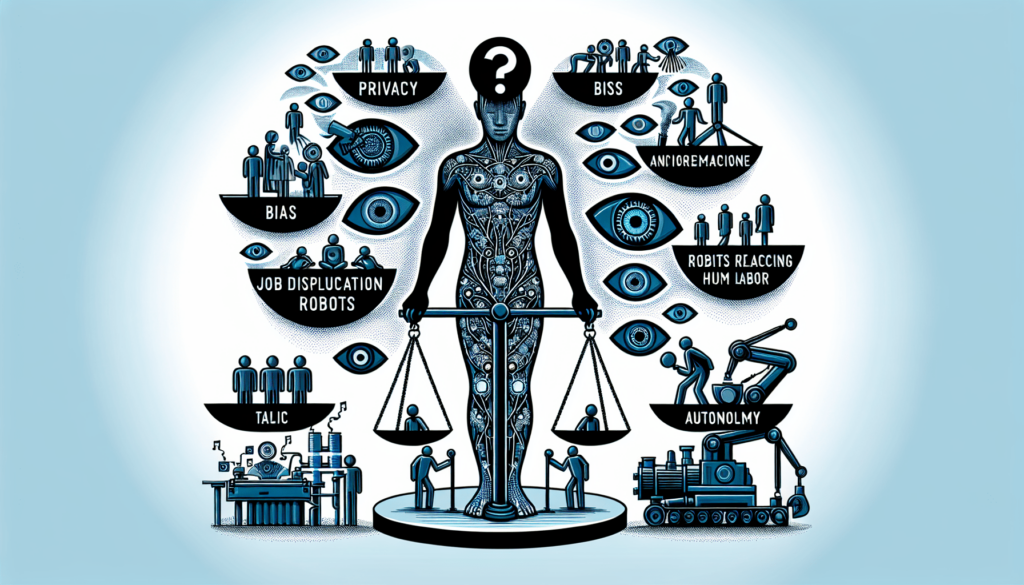Artificial Intelligence (AI) development has undoubtedly paved the way for remarkable innovation and efficiency in various industries. It has opened new horizons of possibilities, leading to economic growth and job creation. The ability of AI to enhance personalization has been widely celebrated, but it also raises concerns about job displacement. However, perhaps the most pressing concerns revolve around the ethical and privacy issues associated with AI. As AI lacks emotional intelligence, there is an underlying fear of uncontrollable AI systems. To tackle these challenges, a collaborative and ethical approach to AI development, along with continuous learning, is crucial. This article delves into the ethical concerns surrounding AI development and explores potential solutions to ensure AI progresses in a responsible and beneficial manner.
Ethical Concerns in AI Development
Artificial Intelligence (AI) has undoubtedly revolutionized various aspects of our lives, bringing innovation and efficiency to industries and providing new horizons of possibilities. As AI continues to advance, it brings forth many ethical concerns that need to be addressed to ensure responsible and fair development and usage of this technology.

Innovation and Efficiency
One of the major benefits of AI is its ability to drive innovation and enhance efficiency across various sectors. AI algorithms can analyze massive amounts of data and provide valuable insights or make predictions that humans may not be capable of. This has the potential to streamline processes, improve decision-making, and ultimately lead to greater productivity. However, along with these advantages comes the need to ethically navigate the impact of AI on society.
New Horizons of Possibilities
AI opens up new horizons of possibilities, enabling us to explore and achieve things that were previously unimaginable. From autonomous vehicles, virtual assistants, to personalized medicine, AI is transforming the world in ways we couldn’t have envisioned just a decade ago. While this progress is exciting, it also raises questions about the ethical implications of these advancements and how they may impact individuals and society as a whole.
Economic Growth and Job Creation
AI has the potential to drive significant economic growth and create new job opportunities. As industries become more efficient and innovative with the help of AI, it can lead to increased productivity and economic prosperity. Additionally, the development and implementation of AI technologies generate a demand for specialized skills, creating new jobs in areas such as data science, machine learning, and AI research. However, there is a concern that AI could also lead to job displacement, as automation could replace certain tasks previously performed by humans.
Enhanced Personalization
AI has the capability to provide personalized experiences by understanding and adapting to individual preferences and behaviors. From personalized recommendations on streaming platforms to targeted advertising, AI algorithms analyze vast amounts of data to tailor content and services to each user. While enhanced personalization can be convenient and improve user experiences, it also raises ethical concerns about privacy and data protection. Striking the right balance between personalization and preserving individuals’ privacy becomes crucial in the development and use of AI.

Job Displacement Concerns
One of the primary concerns surrounding AI development is the potential for job displacement. As automation and intelligent algorithms become more prevalent, certain jobs that are easily replaceable by AI might be eliminated. This raises ethical concerns about the impact on workers who may lose their livelihoods. It becomes essential to ensure that as AI technology advances, efforts are made to reskill and upskill individuals whose jobs are at risk and create new avenues for employment.
Ethical and Privacy Issues
The rapid advancements in AI technology have highlighted the need for ethical considerations and privacy safeguards. AI systems rely on vast amounts of data to learn and make informed decisions, which raises concerns around how this data is collected, stored, and processed. Transparent and responsible use of AI requires addressing issues such as bias in algorithms, ensuring data privacy and security, and establishing clear guidelines for responsible AI development and deployment.
Lack of Emotional Intelligence
One of the significant challenges in AI development is the lack of emotional intelligence in machines. While AI algorithms can process and analyze data, they often lack the ability to understand and interpret human emotions accurately. This can have ethical implications, particularly in areas such as healthcare or customer service, where empathy and emotional understanding play essential roles. Ensuring that AI systems are developed with a consideration for emotional intelligence is crucial to avoid potential harm or dehumanization in human-AI interactions.
Fear of Uncontrollable AI
The exponential growth of AI has fueled concerns about the development of uncontrollable AI systems. There is a fear that as AI becomes more advanced and autonomous, it may surpass human control or understanding, leading to unpredictable and potentially harmful outcomes. Addressing the ethical concerns associated with AI development entails implementing robust safeguards and regulations to ensure that AI systems remain under human supervision and are aligned with societal values and goals.
Ethical AI Development
To address the ethical concerns surrounding AI, it is essential to prioritize the principles of responsible and ethical AI development. Ethical AI should prioritize fairness, transparency, accountability, and inclusiveness. This involves building AI systems that are free from bias, ensuring transparency in decision-making processes, holding developers and users accountable for the impact of AI systems, and incorporating diverse perspectives to mitigate potential societal harm.
Continuous Learning
AI development should also embrace the concept of continuous learning. As AI systems evolve and encounter new situations and challenges, they should be designed to adapt and learn from these experiences. This includes regular updates to algorithms, addressing biases or shortcomings, and ensuring that AI continuously reflects the values and ethical considerations of the society in which it operates. By fostering a culture of continuous learning, AI can be developed in a way that aligns with evolving ethical standards and societal expectations.
Collaborative Approach
Addressing the ethical concerns in AI development requires a collaborative approach involving various stakeholders. To ensure the responsible development and usage of AI, collaboration between researchers, policymakers, industry leaders, and the public is essential. This collaboration can facilitate discussions on ethical guidelines, establish regulatory frameworks, and foster public engagement to shape the ethical considerations of AI. By working together, we can collectively navigate the ethical complexities and guide the development of AI that benefits society as a whole.
In conclusion, while AI brings enormous potential for innovation, efficiency, and economic growth, it also raises significant ethical concerns. From privacy issues to job displacement and the fear of uncontrollable AI, it is crucial to address these concerns proactively. By fostering ethical AI development, prioritizing continuous learning, and embracing collaboration, we can navigate the ethical challenges and ensure that AI technology is harnessed responsibly and ethically for the benefit of humanity.

